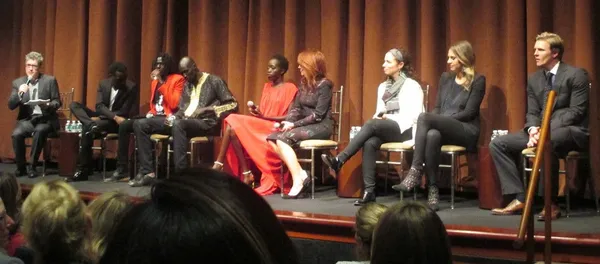 |
| The Good Lie discussion moderated by PEN American Center president Peter Godwin Photo: Anne-Katrin Titze |
Joanna Coles, Peter Godwin, Dr. Amanda Foreman, Gayle King, Diane Sawyer, Mike Nichols, George Stephanopoulos, Fareed Zakaria, Tina Brown and Sir Harold Evans with the US Fund for UNICEF, and Samantha Power, US Ambassador to the United Nations, hosted a special screening of Philippe Falardeau's The Good Lie starring Reese Witherspoon, Arnold Oceng, Ger Duany, Emmanuel Jal and Kuoth Wiel with a screenplay by Margaret Nagle.
Soon-Yi Previn, Molly Smith, Trent Luckinbill, Karen Sherwood, Nile Rodgers, Lynn Stratford, John Prendergast, Chuck Scarborough, Ed Lloyd, Angelina Jacob, Jennifer Duneier, Felicia Taylor, Jill Martin, Bill Blakemore and Phyllis Lee were among those joining in with our hosts for the Warner Bros. screening at Time Warner Center on Columbus Circle near Central Park.
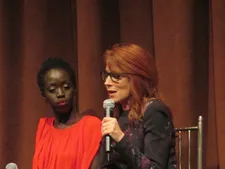 |
| Screenwriter Margaret Nagle with The Good Lie star Kuoth Wiel: "And suddenly I hear, Molly Smith is really interested." Photo: Anne-Katrin Titze |
The Good Lie co-producer Karen Sherwood: When our group of producers became involved in the effort to bring this story to the screen we did so because we were deeply affected by the inspirational story of the "Lost Boys and Girls". Little did we know that by the time of the movie's release another crisis would happen and another generation of "Lost Boys and Girls" would be created. We're grateful to UNICEF for co-hosting this event and for helping us raise awareness of the crisis today and provide help for those in need with our philanthropic initiative The Good Lie Fund. I'm honored to introduce Lynn Stratford, who has been a part of the UNICEF family for two decades.
US Fund for UNICEF Senior Vice President of Program and Community Engagement Lynn Stratford: On behalf of the US Fund for UNICEF and all the UNICEF colleagues around the globe I would like to thank the filmmakers and the entire cast and Warner Bros. for giving us the opportunity to collaborate on such an amazing film. The story is about the children of Sudan, "Lost Boys and Girls" who suffered through the 1980s and traveled thousands of miles on foot in search of safety in refugee camps in Kenya and Ethiopia and it's incredibly poignant that we are here tonight, three decades later and there are still millions of children and families and communities suffering across South Sudan.
Currently there are four million children in need of shelter and food and water and safety. UNICEF is working closely with a number of partners on the ground in South Sudan to provide the urgent care that is required. It's healthcare, immunization and nutrition, clean water and education, in many ways above all. We are trying to re-unite the new generation of "Lost Children" with their families. The Good Lie, I think, is really important because it gives us all an opportunity to hear this incredibly heroic and inspirational story and more importantly, to shed a light on what is currently happening in South Sudan.
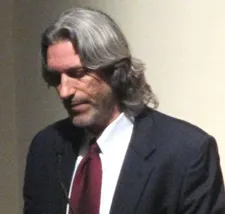 |
| John Prendergast: "'The Lost and Found Boys and Girls' aren't sitting around cursing their fate, they are banding together to press for peace." Photo: Anne-Katrin Titze |
Following the screening, John Prendergast introduced Samantha Power before the panel of filmmakers took the stage.
Founding Director of the Enough Project John Prendergast: Refugee camps at the time in Ethiopia were full with South Sudanese people. Full of "Lost Boys and Girls". Suddenly, the new Ethiopian government in 1991 didn't want those people in their country anymore. They attacked the camps with troops and bomber planes. I was on the Sudan side of the border in relative safety, if you will. I saw and heard some terrible things. Things that wake me up, even now, in the middle of the night. And these things didn't even happen to me. Tragically, now a new war has begun this past December in South Sudan.
Two of the extraordinary talents in the film, Ger Duany and Emmanuel Jal, warned of this coming war throughout the fall last year. Few listened. Maybe the war could have been prevented. "The Lost and Found Boys and Girls" aren't sitting around cursing their fate, they are banding together to press for peace. They are joined by friends around the world. And there's no bigger friend to the cause of peace in South Sudan than the person I'm introducing tonight. Her mother even named her after the fitting phrase 'speak truth to power'. ladies and Gentlemen, the US Ambassador to the United Nations, my dear friend Samantha Speak Truth to Power.
US Ambassador to the United Nations Samantha Power: Is that why my mother married my father? That's interesting. No wonder it didn't work out. I saw the film for the first time in Washington [DC] two weeks ago and I had thought about it every day since. It's a remarkable film to bridge the experience of many of us here in North America, the luxury of our comfortable lives and the unimaginable horror and fear that so many people are living with. Back then, South Sudanese living under fire from the government of Sudan. Today, it could be Syria, it could be girls who dare to take a test in Nigeria.
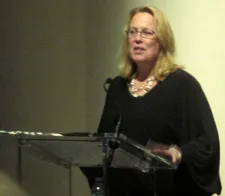 |
| Lynn Stratford: "UNICEF is working closely with a number of partners on the ground in South Sudan to provide the urgent care that is required." Photo: Anne-Katrin Titze |
For us the Reese Witherspoon character [Carrie] and all the people who rally to help these young men and the woman, when they arrive in this country, are a reminder of how much power each of us has as a citizen to do something good every day. The crimes [shown in the film] that one hopes are Hollywood - they are not and they are going on today. The same government who carried out those attacks on those families and those children - the tactics haven't changed. Darfur, which got a lot of attention around a decade ago has fallen a little bit off the radar but the last 9 months in Darfur have been the worst since 2004 in terms of displacement, in terms of the number of attacks.
There are families like those depicted in the film who are living in similar terror today. Civilians have made easy targets for a long time… The idea that South Sudan could break away on its own and become an independent country, then families like the ones you saw could find peace. Unbelievably and outrageously, the leaders who birthed the new country of South Sudan, which was born just three years ago, on July 9, 2011 after a long struggle… the leaders divided. What has occurred since December of 2013 is horrible descent into civil war. Thousands of people killed, many displaced again by the very people who shepherded the country to independence. We are working zealously, and so far ineffectually, to get the opposition leaders and the government to compromise.
Now you have the UN estimating that 9,000 children have been recruited just since December to become child soldiers in this new civil war. This isn't the past, unfortunately, it's the present. Although the depiction of the refugee camp in the film is a mixed one, many of us in this country don't reflect often enough how proud we should be that we have a refugee program like this. President Obama today [September 30, 2014], by coincidence, I don't think he knew about the screening, signed the Presidential Memorandum, authorizing our allocation for the coming year - 70,000 people will come to this country. In the last ten years 15,000 people have come from Sudan, including 3,800 "Lost Boys and Girls" and they've changed our country for the better. Let me introduce Peter Godwin and the stars of the film and a real-life inspiration, I think, for many of us for a long time to come.
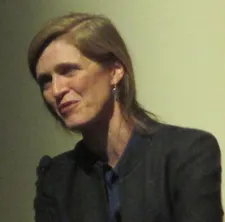 |
| Samantha Power, US Ambassador to the United Nations: "There are families like those depicted in the film who are living in similar terror today." Photo: Anne-Katrin Titze |
Peter Godwin, president of PEN American Center, moderated the discussion on The Good Lie with the film's stars Arnold Oceng, Emmanuel Jal, Ger Duany, Kuoth Wiel, screenwriter Margaret Nagle, producers Karen Sherwood, Molly Smith and Trent Luckinbill.
Peter Godwin: An extraordinary movie. I want to start with Margaret Nagle, who was the original writer and whose baby this was on somewhat of a marathon pregnancy.
Margaret Nagle: It was an 11 year pregnancy. We had many regimes at Paramount, none of whom thought this was possible. Karen Sherwood rescued [the script] from the scrap heap and then to Molly and Trent who rescued it from oblivion.
Karen Sherwood: I had only become familiar with their story when it was first written about in The New York Times. There was a piece called From Hell To Fargo. I knew that there was inspiration in it. When Margaret started, it wasn't quite as unusual for a studio to make that kind of film. In 2008, it was much more unusual, and it just kept getting more and more unusual as time went on. Independent companies started to crop up. And Molly Smith runs a company that does that, that tells those stories.
Molly Smith: The time when it fell in our lap, two and a half years ago, we were just starting. Ink was drying on our business plans of our indie finance production company. I just fell in love with it. The unique perspective I had, I'm from Memphis, Tennessee, and very similar to what you saw in the movie, my sister one day in 2001 met three "Lost Boys" at church. One of them became really my adopted brother, who is now a PhD engineer in Memphis and just an incredible guy… Margaret told the story in a way that invites a larger audience in.
Trent Luckinbill: The reason why we saw the script in the first place was that it came as a writing sample. We were actually just looking to see her writing style. It goes to the point that this was meant to be. This would be the inaugural movie for our company Black Label and it's something that we're really proud of.
 |
| The Good Lie cast Arnold Oceng, Ger Duany, Emmanuel Jal and Kuoth Wiel Photo: Anne-Katrin Titze |
Margaret Nagle: At this point, I was in year 9 and it was just hopeless. Everyone in town said no. And suddenly I hear, Molly Smith is really interested. Her brother is a "Lost Boy".
Arnold Oceng (Mamere): i've been acting for a while in the UK and my agent came across the script. He said, "The Good Lie, I already set you up for it. They don't want to see you. They say you're too short." A month later they called and I sent an audition tape to LA. At this time, I didn't know it had all the big producers involved. I didn't know it was Warner Bros., Reese Witherspoon, Ron Howard involved - I didn't know all that razzmatazz. I didn't know it was a world-wide casting. We all had castings in LA with Reese…. I may have a British accent but I come from Ugandan refugees. My mom is Ugandan and my father is from South Sudan and my father passed away when I was two. My mom fled Uganda and came to the UK. When my father passed away, I closed the door on my Sudanese heritage. I don't know my father's side. Maybe part of this movie was me re-opening that book. When I first got the script, I didn't even know about "The Lost Boys", the killings and the genocide that was going on. I learned so much from Emmanuel, Ger, and Kuoth. I was like a sponge soaking up everything from them.
Emmanuel Jal (Paul): I will say: I'm a war child - A "Lost Boy" - Lucifer tried to destroy - with so much pain and very little joy - collection cup was my childhood toy. We came from the bottom - like lobsters - we're now rolling on the top - like rockstars. All my aunts died in the war, my mom was claimed by the war, all my uncles died except two. By the age of seven we were told we would go to school in Ethiopia so we walked for miles. By eight I was trained and became a child soldier. I escaped from being a child soldier when I was 12, turning 13. In a January like 400 young people and only 16 survived. The lowest point I've ever been. Then I was smuggled into Kenya. That's where I connect with civilisation. Fasting forward, now I'm a recording artist. And now I'm in the movies as you could see. It's good to sell your soul a bit.
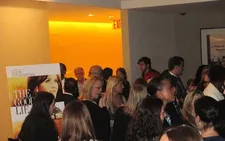 |
| The Good Lie reception at the Time Warner Center in New York. Photo: Anne-Katrin Titze |
Ger Duany (Jeremiah): It's been a long journey. No one coached me that I could sit here in front of you guys and talk about our past civil war that claimed over 2.5 million people. When the civil war broke out I was very young, probably 7 or 8. We took a long walk all the way to Ethiopia where we stayed till 1987. We spent a lot of years in refugee camps. In 1991 Ethiopia had its own civil war. By the time we got back to South Sudan, our previous enemies, which were Northern Sudanese were bombing us. We didn't have a place to go. There was no place in 1991 in East Africa that didn't have a war. in 1994, I finally had the opportunity to come to the United States. I went to High School here. Watching this movie is pretty much parallel to my own life story.
Peter Godwin: Kuoth, you're also Sudanese. How old were you when you came to America?
Kuoth Wiel (Abital): Eight. My parents were aid workers for the UN, so that's how I ended up in a refugee camp. Very often we traveled back and forth from Sudan to Ethiopia. I'm the only member of my family born in a foreign country in that sense. I remember from being a very young child not having a place to call home. So eventually, we ended up in America through my brother who was a "Lost Boy" and he ended up in Kenya. That's how we eventually got to Minnesota and I grew up there and went to college. I think the film is a testament to our survival.
The evening concluded with a Supper party at The Park Café.
The United Nations Children’s Fund (UNICEF) works in more than 190 countries and territories to save and improve children’s lives, providing health care and immunisations, clean water and sanitation, nutrition, education, emergency relief, and more. The U.S. Fund for UNICEF supports UNICEF’s work through fundraising, advocacy, and education in the United States. Together, we are working toward the day when ZERO children die from preventable causes and every child has a safe and healthy childhood.
The Good Lie opens in the US on October 3 and in the UK on December 12.





















